


This summary for Game Five was written by Eauxps I. Fourgott. Many thanks for volunteering to put this report together! 
Game 5 was set up to be a classic "good versus evil" showdown, with three high peaceweight leaders in the south squared up against three low peaceweight leaders in the north. The teams looked all the more likely to stick together because only two of the six leaders, one per team, will declare war at Pleased relations. On paper, the advantage belonged to Team Evil, as they boasted both seeded leaders, Kublai Khan and Cyrus, and as a result about 70% of the picking contest had picked either one of them or the trio's third member, Boudica, to win the game. On the flip side, nearly 85% of predictors had picked one of the members of Team Good - Asoka, Churchill, and Roosevelt - to die first, although no single leader had a majority vote in any of the picking categories, reflecting a perception that this game was up in the air with no true favorite. Were the predictors right in backing Team Evil? Would the underdogs come out on top for this matchup? Or would the teams break apart and fight among each other instead?

This game's landgrab phase ended up moving rather fast. The six leaders had started in fairly cramped quarters, and for the most part expanded quickly out of the gate. As one might expect, the fastest expander was Cyrus, who used his Imperialistic trait to stay a bit ahead of the field, although he was limiting his upward growth by refusing to tech Mysticism for ages. Kublai had no such issues thanks to his free Creative culture, and so had an overall solid if unspectacular opening. By contrast, Churchill was the slowest expander early on and delayed Mysticism until after Turn 50; it wasn't an impressive opening for him, and his cities mostly sat in the middle of forest and jungle that would take some time to cut down. Boudica had similarly tough territory near her start, although founding Islam in a well-placed Holy City helped boost her score up in the early going. Asoka founded the other initial religion of Buddhism as expected, and followed that up with a Stonehenge build for a strong early cultural gameplan. But it was Roosevelt who was at the center of attention to start with; he had the best capital location on the map, one boasting double silver resources to go with its generous food bonuses, and he researched Mining almost immediately to hook those up and race out to an early lead in beaker count. This was the sort of great start that can potentially carry any leader to victory, and for a little while it looked like Roosevelt might be on that path. But then disaster struck:
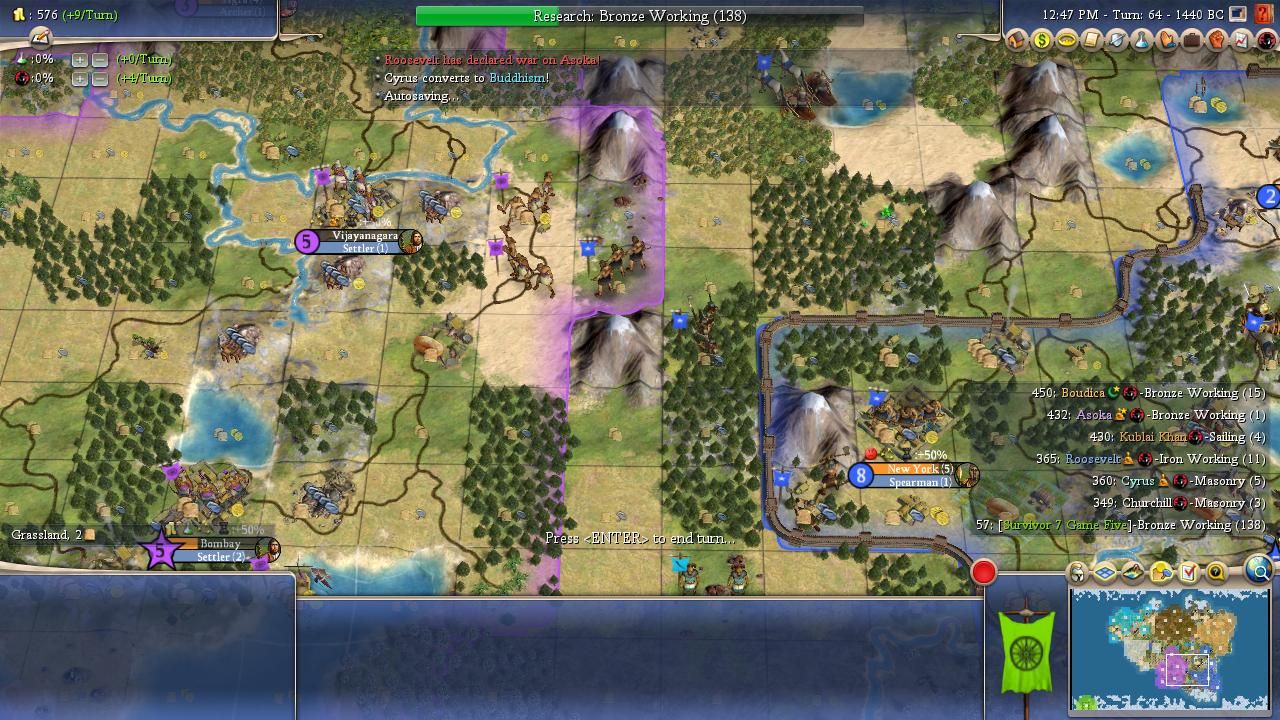
Roosevelt, what in the world were you thinking?!?  Not only did the American leader lack Construction for catapults, he didn't even have Iron Working for swordsmen yet! He was also lacking basic techs like Writing and Mysticism, and the initial attack stack had all of four units in it - even Lincoln back in Game 2 could have fought this off! This war indeed went nowhere; both leaders stalled out as they diverted their resources to this conflict, but Roosevelt was now in especially bad shape, still stuck on just five cities and without the cultural bent that would at least leave Asoka with an outside chance of victory. The two leaders would eventually sign peace after about 35 turns of fighting, but the damage had been done. Roosevelt had wasted a lot of critical early-game production, completely throwing away a promising start and dooming himself to being a lesser power in this game.
Not only did the American leader lack Construction for catapults, he didn't even have Iron Working for swordsmen yet! He was also lacking basic techs like Writing and Mysticism, and the initial attack stack had all of four units in it - even Lincoln back in Game 2 could have fought this off! This war indeed went nowhere; both leaders stalled out as they diverted their resources to this conflict, but Roosevelt was now in especially bad shape, still stuck on just five cities and without the cultural bent that would at least leave Asoka with an outside chance of victory. The two leaders would eventually sign peace after about 35 turns of fighting, but the damage had been done. Roosevelt had wasted a lot of critical early-game production, completely throwing away a promising start and dooming himself to being a lesser power in this game.
While this was going on, Kublai Khan was quietly building a big score lead. Cyrus had led in early expansion but stopped after seven cities, while Kublai kept going until he had nine. Coupled with his guaranteed culture, this gave him a strong territorial base, and he was soon multiple hundreds of points ahead of the closest competition. Cyrus hadn't done much of anything since he'd stopped expanding, and despite Roosevelt's terrible war declaration dragging him down, Churchill somehow was still doing even worse in score thanks to his weak start. But the leader who was really on thin ice at present was Boudica: her poor territory, along with a refusal to go for economic techs for ages on end, resulted in her research being badly bogged down over the first 100 turns, and she further had the bad luck to see Asoka's Buddhism be adopted by every other leader on the map, leaving her as the only practitioner of Islam. With no strong allies, her position was precarious indeed.
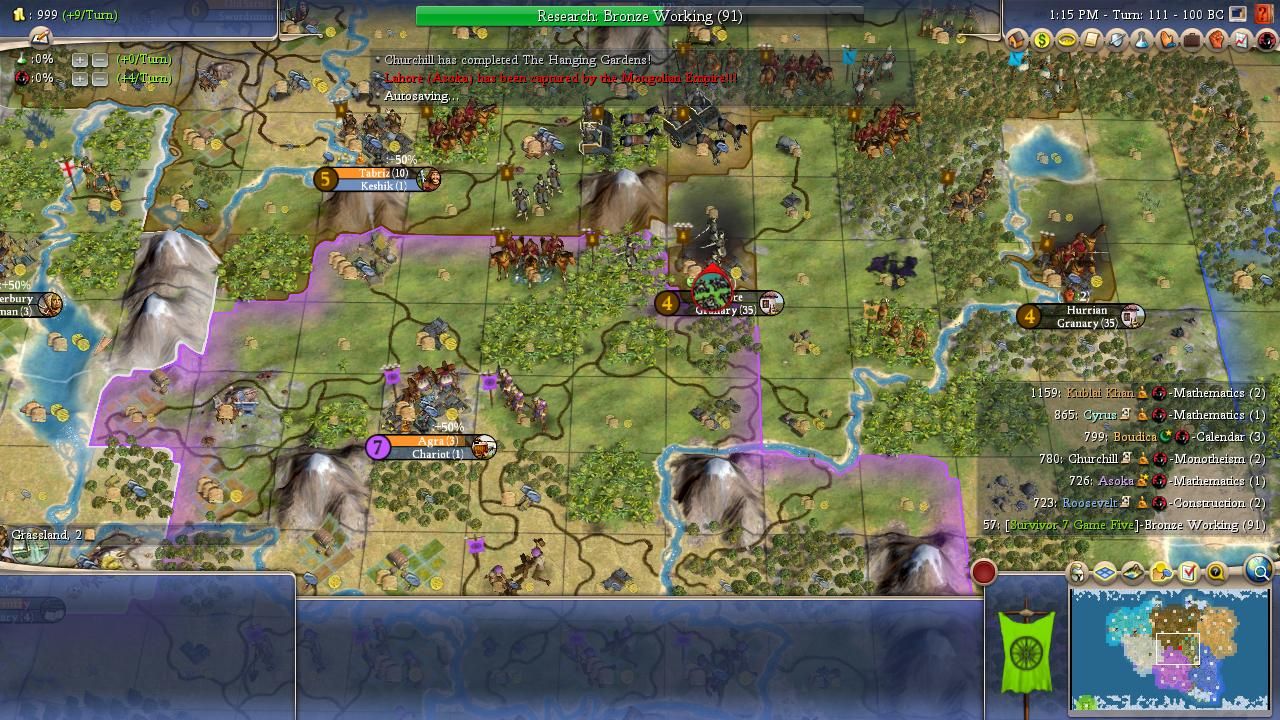
Fortunately for her, her most dangerous neighbor had a different target in mind. Kublai did declare the next war of the game, but it was against Asoka to the south. With no danger of a backstab from close to home, Boudica herself looked south and soon declared on Roosevelt. Both warmongers were taking on foes who were weakened from a recently-concluded stalemate, but they still did not have catapults, and so found it hard to make progress, finding themselves stuck in bloodbaths instead of getting quick conquests. Still, if nothing else they were certainly stopping the two southern leaders from rebuilding, and in particular were snuffing out Asoka's hopes of a cultural victory, as he simply couldn't build well enough under this constant pressure. Meanwhile, it seemed as though Kublai's betrayal of his Buddhist brother had soured people on the religion, as one by one the other members of their coalition dropped the faith. Roosevelt and Cyrus soon founded and converted to their own religions of Christianity and Judaism, and Churchill would eventually do the same with Confucianism, while Asoka used the Shwedagon Paya wonder to revolt into Free Religion, resulting in a world that would go the rest of the game with with no shared religious bonds. This was most significant for Cyrus, as at one point he had been Pleased towards everybody and thus completely unable to declare war! By contrast, after his conversion, he was Cautious or lower towards, and thus willing to attack, everybody else. He accordingly soon started plotting, and his choice of target would throw a wrench in the whole game:
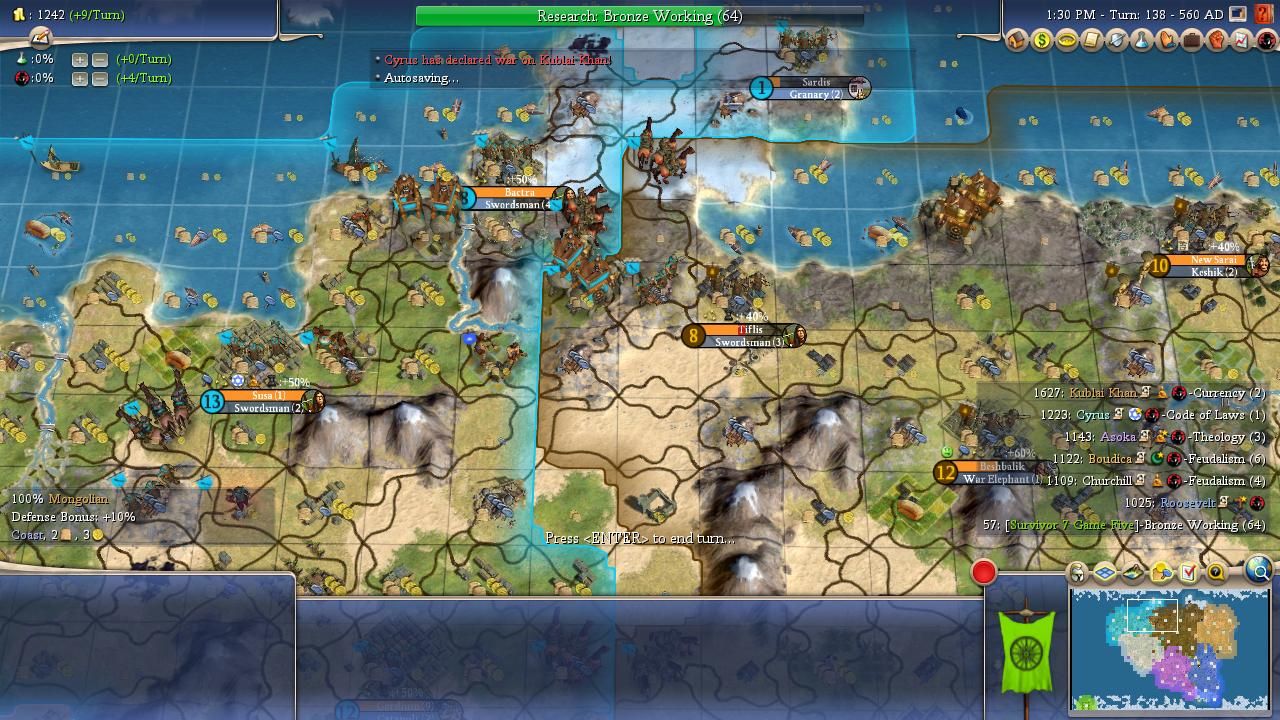
Kublai! What a backstab! Suddenly instead of a comfortable runaway position, Kublai was stuck fighting for his life in a two-front war. Cyrus's big stack rolled through and took two Mongol border cities with little trouble, showing that he meant business. Kublai's army had taken only one Indian city up to this point; after finally breaking through at a second following a lengthy siege, they had to give up the offensive, turning to face the Persian invaders and relieving the pressure on Asoka. The next big event would be a clash of the two big stacks, a battle that would determine if Kublai was doomed or could hold out... but before that could happen, Cyrus opted to sign peace, going home with a nice tidy war, up two cities with few losses. Despite the success on paper, though, Cyrus was missing a golden opportunity to do more damage to his closest competitor while he had him on the ropes. It was true that he'd knocked Kublai out of a runaway position, but he was giving up his chance to definitively take the lead himself, and now the two seeded leaders were jockeying for first place instead. Cyrus's peace treaty also left Asoka out to dry... except that, with his armies outside the next Indian city, Kublai chose to sign peace with him as well, having taken just two of his cities to cripple but not completely eliminate him. Kublai was now himself passing up the chance to get out in front; instead, he was emerging from these long years of fighting with the same number of cities that he'd started with. All the warring had tanked his economy, though, so perhaps he really did just need a while to peacefully rebuild.
Not much was going on in the rest of the world during all of this. Churchill was content to just sit back and watch, although with just six cities, and one of those under heavy culture pressure from India, he probably couldn't have done much even if he'd tried. Over in the east, Boudica had the advantage of numbers over Roosevelt, but wasn't able to take more than a single city. Her initial progress was slow, and then it came to a complete stop as she lost multiple stacks in unsuccessful attacks on the city of Boston. Roosevelt further stymied her by researching all of the medieval military techs before she could, and so the game settled into a rather quiet period. Four leaders sat at peace, playing the builder's game for now, while the other two remained embroiled in a long war that went nowhere. Everybody had full medieval military tech at this point, and nobody was too far ahead. Kublai still led the game in score, but not by very much, while Cyrus had a slight economic lead thanks to building the Great Lighthouse early in the game and now having a full seven coastal cities. The game continued to go by with little action; Turn 180 came and went, and nobody was yet close to death. But soon after that, things finally picked up again:
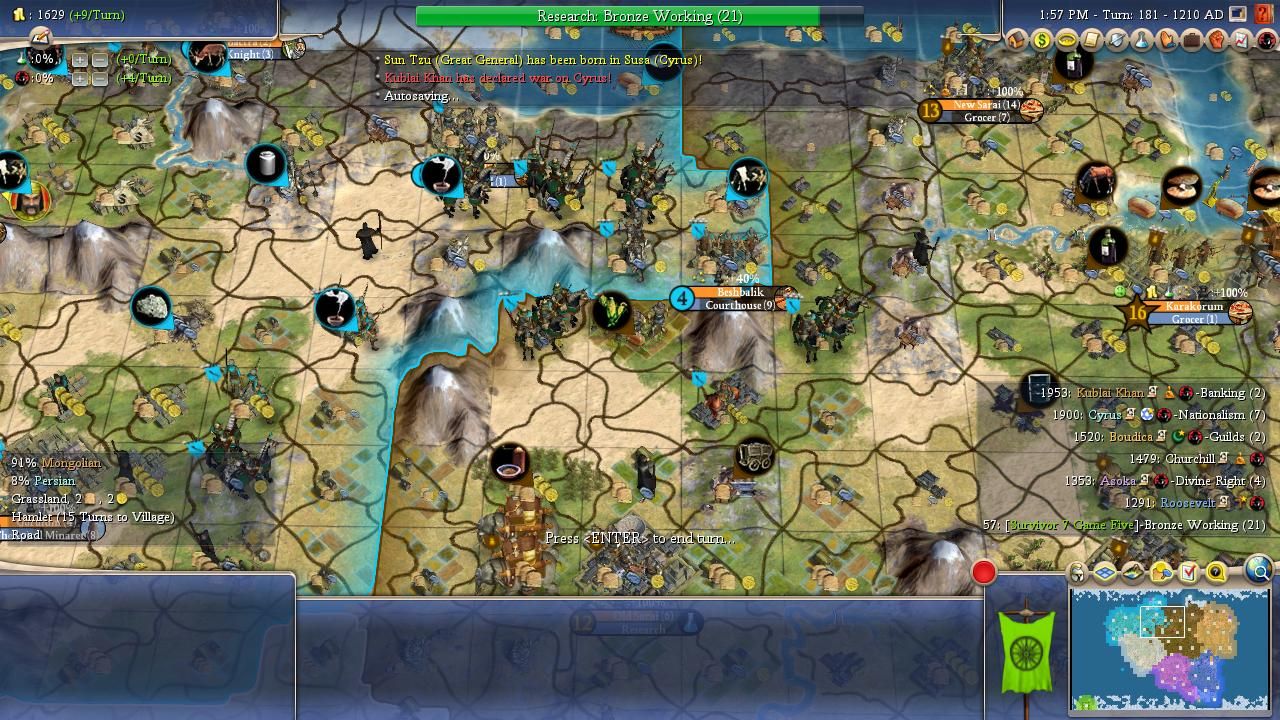
Kublai was back for some reveeeeeenge! Suddenly Cyrus's peace treaty from earlier wasn't looking like it had been such a great decision. He and Kublai had roughly equal-sized empires and tech parity at the start of this war, but Kublai's military was bigger, his main stack about 70 strong. The Mongols wasted a few turns at the beginning of the war as that stack just sat in place, not doing anything, but eventually they got on the move. While they'd been waiting, Kublai's reserve forces had cleaned up all of Cyrus's attackers in the first bad sign for Persia, and when the stack arrived and attacked the first Persian city, there was no stopping them. Cyrus was putting up a good fight, forcing Kublai to sacrifice quite a few units to take the city, but he was losing just as many himself and could worse afford the losses. What he now desperately needed was for somebody else to dogpile Kublai and give him some breathing room... but the two eastern leaders were still locked in their war, Churchill was pleased towards Kublai and thus would not attack him, and after being sold out earlier in the game, Asoka had no interest in coming to Cyrus's rescue now. With no distractions, Kublai continued to press his attack, grinding inexorably through the Persian cities, his advantage getting steadily bigger with each city taken. He was back to being several hundred points ahead of the rest of the competition, finally resuming his dominant status from earlier in the game.
Meanwhile, the status quo in the rest of the world remained stable. Boudica and Roosevelt finally signed peace after long, long years of fighting, and Boudica gave back the one city she had managed to conquer, making this war a totally pointless drain of resources for both leaders for ages on end. A bit earlier, Churchill had marched a stack across the map to attack Boudica in a war that went nowhere and was quickly ended via peace treaty; Boudica remembered this, though, and so after ending her war with Roosevelt marched her own stack across the map to return the favor, right after Churchill had declared war on Cyrus to try and vulture some of his land. Aside from a lone former barb city in the far north, the Celtic army only took a single, hopelessly culturally crushed English city before stalling out and turning this into another stalemate, and Churchill would eventually retake both cities before signing peace; still, this was enough of a distraction to stop him from conquering any Persian cities. While Boudica was thus distracted, Roosevelt went back to war with her, but his attack stack was destroyed at the first city it attempted to siege. None of these leaders could gain an upper hand. In the middle of all this, Asoka was huddled in place, just hoping to not get attacked and to slip through peacefully. His early wars had distracted him from peaceful building too much for even a Cultural victory to be in the cards.
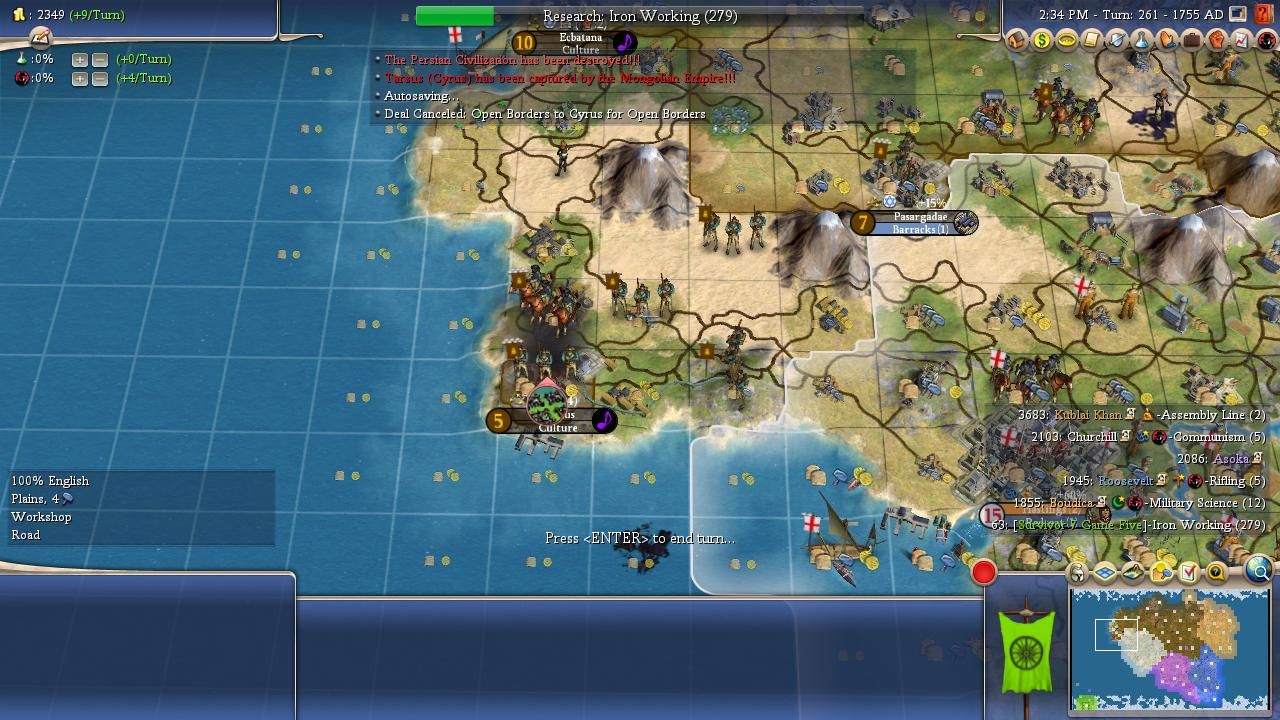
While the other leaders continued in stagnation, Kublai was finishing up his conquest of Cyrus, who eventually was indeed the First to Die at the very late date of Turn 261. This was quite the fall from grace; Cyrus at one point had seemed like the most likely game winner, but instead finished in dead last. It's very easy to see where his game went wrong: he signed peace with Kublai far too easily, giving up his advantage and big opportunity to cripple the Khan, and settling only for picking up a couple of cities and inconveniencing him. The peace treaty ended up being the single biggest turning point in the game: instead of conquering the game leader, Cyrus left him strong enough to later turn around and attack back with superior numbers. Other than that initial backstab, he never took any action to go for a win. He did only an average job of settling, and never attacked (or seemingly planned to attack) any other leader. He just tried to tech out to a lead with an only slightly above-average economy, and that probably wasn't going to cut it even if Kublai had left him alone.
This was now very clearly Kublai's game, with second place very likely a matter of whom he didn't decide to kill before the end of the game. His next victim was a complete tossup at this point; he had the longest borders with Boudica and Churchill, but liked them more than he did Asoka and Roosevelt. Thus it was more or less entirely random chance that when he immediately started plotting war again, ready to press his advantage in earnest, Roosevelt ended up being the unfortunate target. There was no drama in this war; Kublai now had infantry while Roosevelt did not, possessed the overwhelming edge of numbers, and so quickly tore through the American cities, in several cases not even bothering to bring siege units and just brute-forcing his way through the defenses. This was impactful in the race for second place, though: Churchill had been comfortably occupying that spot, thanks to Asoka's small size and Boudica suffering rampant war weariness and Emancipation unhappiness, causing her cities to starve. However, the conquest of America freed up a lot of cultural pressure from Asoka's eastern borders, his own culture filled in the empty space, and that catapulted him up into the number two position! All three of these leaders had ended their earlier squabbles and were now at peace; it was fully the Kublai show.
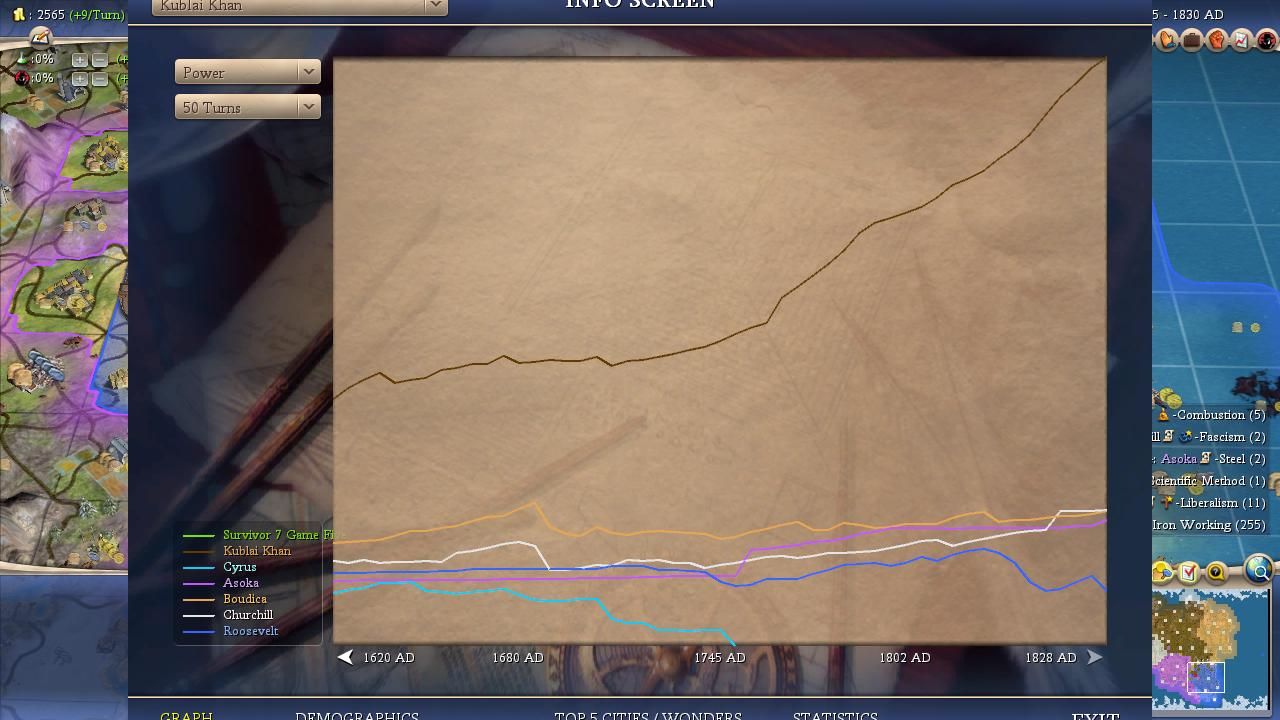
Roosevelt soon exited the game, dying less than 40 turns after Cyrus. This had been a particularly incompetent performance; Roosevelt had been gifted the best capital on the map, had the potential to leverage that to a victory, but instead threw it all away on a pointless early war. Completely through his own actions, he sent himself from an early favorite to win to an irrelevant leader who couldn't significantly impact the game. His elimination here was fully deserved. Now we were down to four leaders, and again it was all a matter of whom Kublai chose to leave alive to move on. He wasn't going to stay at peace for long, but while he could still theoretically attack any of the remaining leaders, he was now Annoyed towards Asoka, and their new shared border was about the same size as those Kublai shared with the other leaders, leaving him the clear most likely target. Would Kublai go with the expected choice, or would the Indian get another stay of execution?
This time, the odds won out. Kublai was finally coming back to finish the job he had started long ago, and conquer Asoka. This was another swift conflict; Churchill and Boudica were by now off fighting each other again, but even if they hadn't been, they wouldn't have been attacking Kublai - not with him being so terrifyingly far ahead in power. Soon India had been wiped off the map. Unlike the first two eliminees, poor Asoka hadn't done anything here to deserve this fate. Instead, he'd been a victim of his starting position and the luck of the draw, hamstrung from a very early date by wars that he couldn't do anything to prevent - in one case, he was attacked just before spreading his religion to that neighbor, and in another, his religious ally backstabbed him! Roosevelt's early attack had thrown Asoka off and set him back; Kublai's slightly later one permanently crippled him and left him without any path to victory, through no fault of his own. He made a game effort and came tantalizingly close to making it through anyway, but it was not to be.
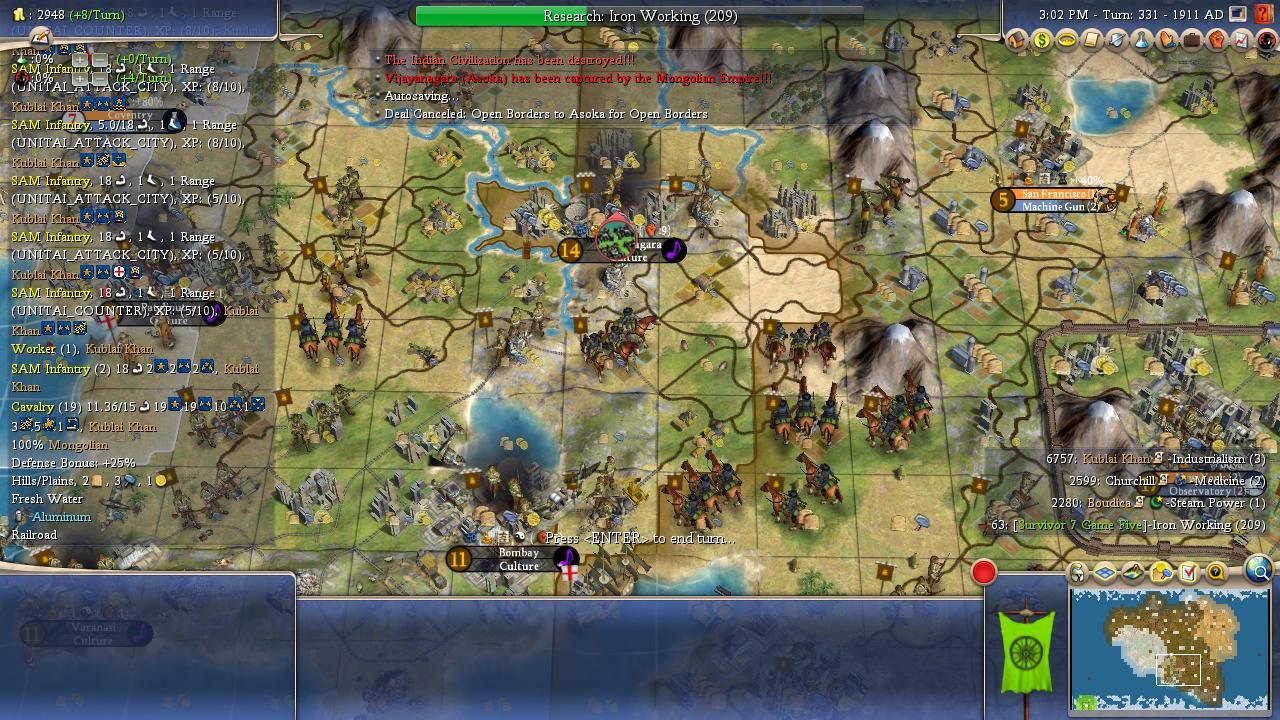
And thus we were about at the end of the game. Kublai was the clear winner, and Churchill had cemented a strong second place position. Boudica had attacked him once more, managed to take that single former barb city again, and come within 100 points of his score - but once he got his military up to Celtia, he clearly had the upper hand, possessing infantry while Boudica did not, and so soon retook his city and permanently established his advantage. As a result, Kublai now just needed to get across the finish line to finalize the results, and like we've seen in many a game by this point, he'd ended his last conquest just a couple of percentage points below the land area threshold for Domination. Thus the game would go on only a little bit longer; Kublai needed 20 or so turns to consolidate, pop borders, and grab a few more land tiles via his superior culture. Once he did that, the game was over.
The curse of the Pool One leaders has finally been broken! Kublai wins a very well-deserved Domination victory, in an excellent performance from start to finish. From the end of the landgrab phase on he was in a strong first place, and his only period of danger came from a somewhat unlucky backstab by Cyrus - one made possible by Kublai's treacherous central position, and only because Cyrus happened to found his own religion later in the game. That was where Kublai could have lost the game, but instead he was able to wrangle a peace treaty, consolidate, then come back stronger and turn the tables on his former attacker. From that point on he simply coasted to the win. Other than a few short turns where Cyrus briefly jumped in front after taking a couple of cities, Kublai was always in first place once he grabbed that spot late in the landgrab, and his performance in this game was head and shoulders above anybody else's - other than Cyrus's two cities taken in his backstab, and a single Celtic city that Churchill took at the very end of the game, none of the other five leaders ever took a city that they were able to hold through the end of a war! Kublai thus moves on to face fellow low peaceweight leaders Hannibal and De Gaulle in the playoff round, a match where it already looks like he'll have a tougher path to victory.
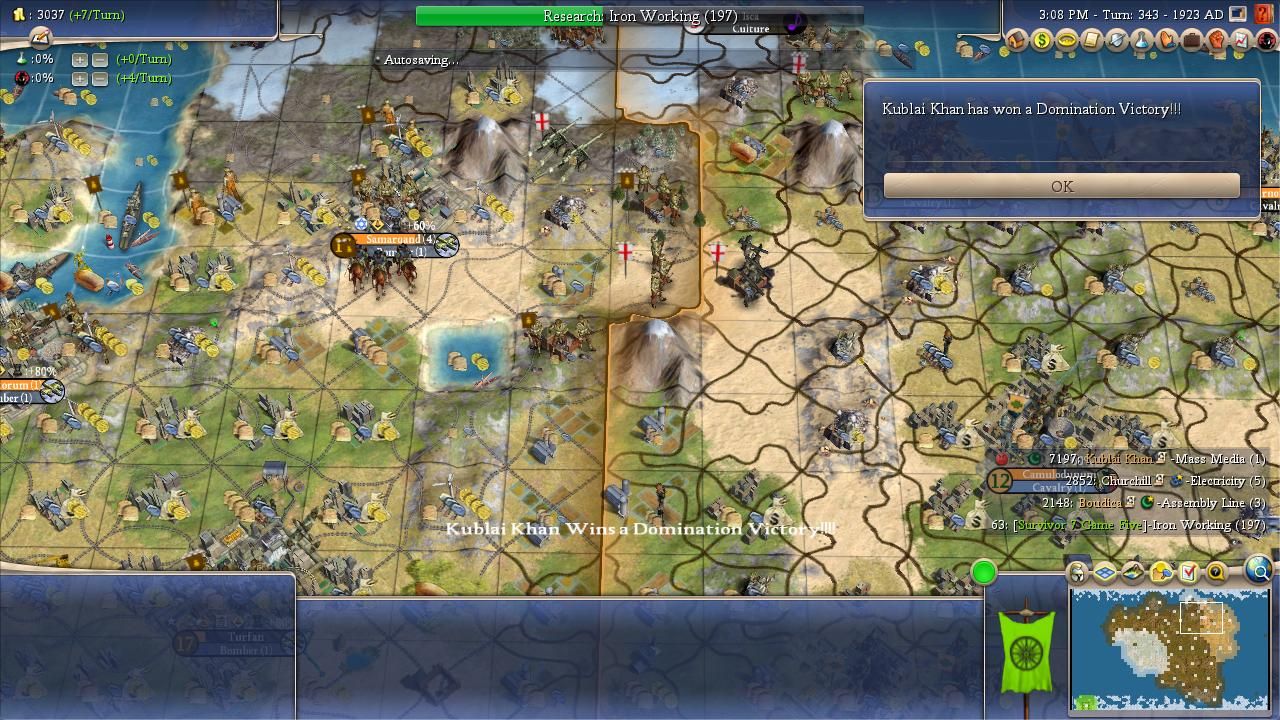
As for Churchill, he takes second place by not doing much of anything - but in a game as messy as this one, that was all it took to comfortably move on. With other leaders repeatedly either getting piled on or declaring ill-advised wars, Churchill prospered by keeping his head down, staying out of trouble, and watching everybody else implode. He didn't play a very active role in his finish, but frankly, after his poor landgrab, he didn't have much opportunity to better his position - and the one time he did, he tried to dogpile Cyrus, only to get blindsided by a Celtic attack instead. Overall he didn't set himself up well, showing once again that he's not very good at the early game, but once the landgrab phase was done, he took what he had to work with and did a pretty solid job with it, even if it's far from a good enough performance to change anybody's mind about his merits as an AI. In any case, he's moving on, joining Hammurabi, Joao, and Suryavarman in a playoff game that's beginning to look like it might favor the higher peaceweights.
Finally, Boudica manages to survive to what promises to be a very violent wildcard game. This was a thoroughly uninspiring performance from her, as she had a beautiful opportunity to beat up on a weakened foe and start to snowball, only to completely bungle the attack, failing to ever take more than a single city despite holding the power advantage. After her failed war against Roosevelt, there wasn't much for her to do except continually spar with Churchill, and her poor economy eventually ensured that she was on the losing side of that battle. Fortunately, like Churchill, she was never attacked by Kublai and thus never faced significant danger, thus allowing her to at least survive; the lack of Islamic spread had seemed like a dangerous situation, but ultimately had no impact on how the game played out since everybody went on to found their own religions anyway. So Boudica survives, but she'll have to do a much better job than this in the wildcard game if she wants to see the playoffs.
In the end, this didn't at all play out like a Good vs. Evil showdown like the setup had suggested. Instead the two "teams" suffered infighting from an early date, and this first became an every-man-for-himself affair before turning into a Kublai romp in the later stages. Cyrus's well-timed backstab stopped Kublai's snowball temporarily, causing this game to last a lot longer than it otherwise would have, but once he was foolish enough to sign peace, Kublai was able to recover and eventually get it rolling again, after which this became a pretty pedestrian affair. Going in this had seemed like a less impressive field of leaders than we see in most games, and that was borne out by the lack of very good play by anybody except Kublai. With a more stacked group of leaders in the next game, we'll see if the quality of play picks up at all or if, in the end, they'll all just act like silly AIs again. In any case, thanks for following along with this season of AI Survivor!



